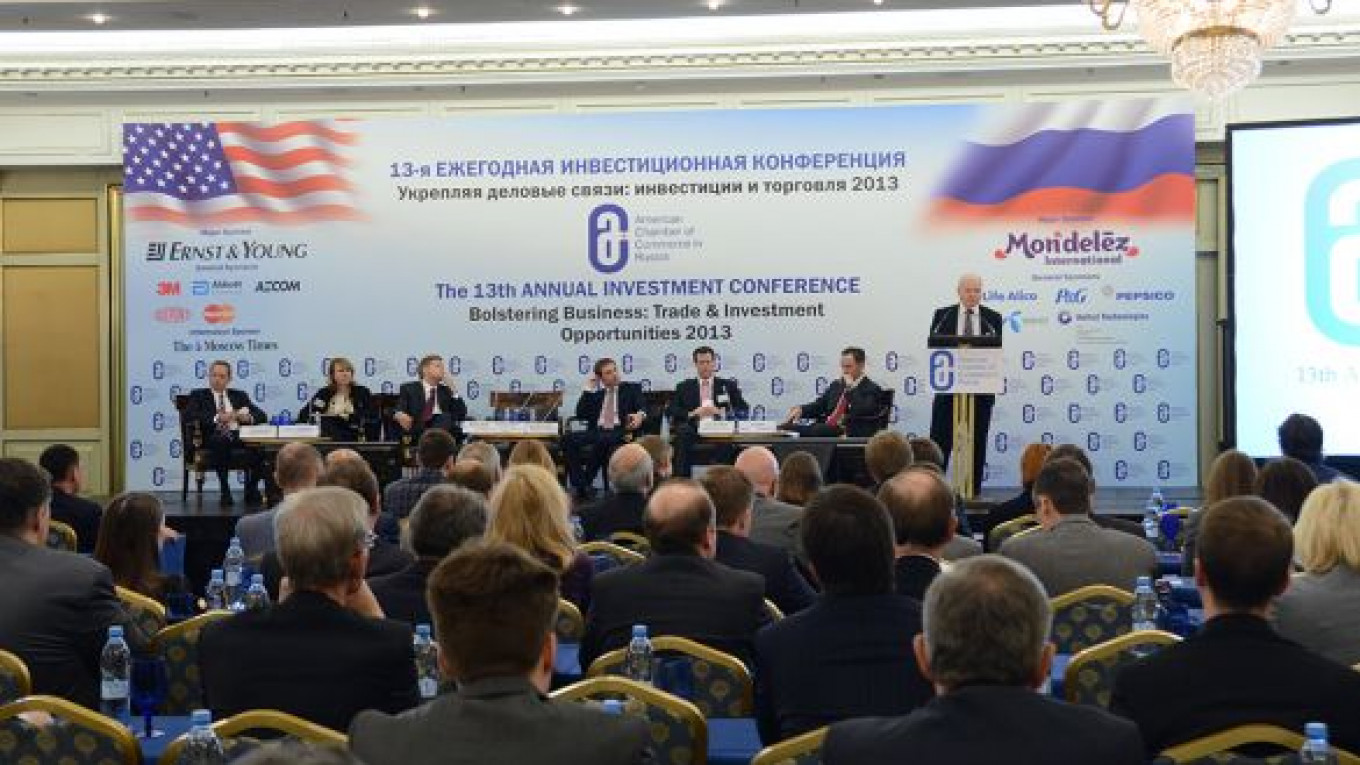ExxonMobil was a highlight of an investment conference in Moscow on Wednesday, attended by U.S. Ambassador Michael McFaul, where speakers discussed the prospects of U.S. business in Russia.
Organized by the American Chamber of Commerce in Russia, the event sought to emphasize trade and investment despite political tensions between the countries.
McFaul recalled how President Vladimir Putin and President Barack Obama discussed ExxonMobil's business in Russia at their latest meeting on the sidelines of a Group of 20 event in Mexico in June.
"As we began to talk about issues like Syria, Iran and North Korea, the conversation stopped. President Putin said, 'Wait a minute. I want to get to all those things, but first I want to talk about Rosneft and ExxonMobil,'" McFaul said, adding. "And it was a really interesting thing."
The companies have agreed to join forces in exploring and developing offshore oil and gas fields in the Russian waters of the Black Sea and Arctic, an effort that will require billions of dollars in investment.
McFaul brought up the deal as he touted the great potential of bilateral business ties, even as he pointed to rifts between the countries. To name a couple points of contention, Moscow and Washington have sparred over the civil war in Syria and the Magnitsky Act, which punishes Russian officials suspected of violating human rights.
The continuity in working together on some other issues, such as Afghanistan, is helpful in promoting economic engagement with Russia, he said. McFaul also described Russia's cooperation in the Boston bombing case as "tremendous."
Increasing trade and investment between Russia and the United States remains a top priority for President Obama's administration, McFaul said.
"We are tired of ups and downs," he said. "We want to have a normal relationship with Russia."
Putin and Obama will have a chance to boost ties when they meet twice later this year: on the sidelines of the summits of the Group of Eight in the United Kingdom in June; and the Group of 20 in Russia in September.
ExxonMobil surfaced again later in a speech by Andrea Lockwood, deputy assistant secretary for Eurasia, Africa and Middle East at U.S. Department of Energy.
"We are very excited about the partnership between ExxonMobil and Rosneft," she said.
Glenn Waller, president of ExxonMobil in Russia, commented on the plethora of comments about his company when he took the floor.
"I was happy to hear from Ambassador McFaul that it has been discussed at the highest level between presidents," he said. "We have very strong support from various levels of the Russian government."
The deal with Rosneft brings together the world's two largest companies in the industry, he said. ExxonMobil leads by market value, while Rosneft is No.1 by reserves and production, after completing the takeover of rival TNK-BP in recent weeks.
One of the Arctic fields ranks as ExxonMobil's biggest global exploration project, Waller said.
Deputy Economic Development Minister Sergei Belyakov told the AmCham conference that foreign direct investment into Russia amounted to $50 billion. He didn't give comparative numbers.
Suma Chakrabarti, head of the European Bank of Reconstruction and Development, delivered a speech at the U.S. Chamber of Commerce in New York on Monday where he also tried to convince potential investors that a chill in the political climate shouldn't hamper business ties with Russia.
Contact the author at medetsky@imedia.ru
A Message from The Moscow Times:
Dear readers,
We are facing unprecedented challenges. Russia's Prosecutor General's Office has designated The Moscow Times as an "undesirable" organization, criminalizing our work and putting our staff at risk of prosecution. This follows our earlier unjust labeling as a "foreign agent."
These actions are direct attempts to silence independent journalism in Russia. The authorities claim our work "discredits the decisions of the Russian leadership." We see things differently: we strive to provide accurate, unbiased reporting on Russia.
We, the journalists of The Moscow Times, refuse to be silenced. But to continue our work, we need your help.
Your support, no matter how small, makes a world of difference. If you can, please support us monthly starting from just $2. It's quick to set up, and every contribution makes a significant impact.
By supporting The Moscow Times, you're defending open, independent journalism in the face of repression. Thank you for standing with us.
Remind me later.






